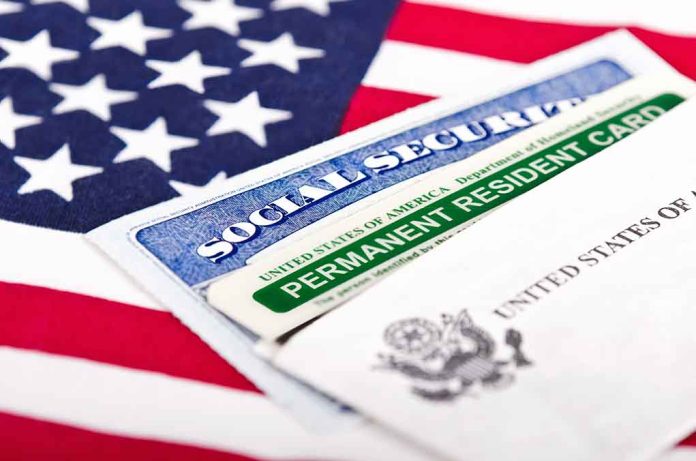
House Judiciary Committee holds a pivotal hearing on birthright citizenship as constitutional scholars debate the true meaning and application of the 14th Amendment’s Citizenship Clause.
Key Takeaways
- The House Judiciary Subcommittee on the Constitution and Limited Government held a hearing on February 25, 2025, titled “‘Subject to the Jurisdiction Thereof’: Birthright Citizenship and the Fourteenth Amendment.”
- Legal experts including Charles J. Cooper, R. Trent McCotter, Matt O’Brien, and Amanda Frost provided testimony examining the meaning of the Citizenship Clause.
- The 14th Amendment’s Citizenship Clause, ratified in 1868, has been interpreted by the Supreme Court in United States v. Wong Kim Ark (1898) to guarantee citizenship to all children born on U.S. soil regardless of parents’ citizenship status.
- The Leadership Conference on Civil and Human Rights, representing over 240 national organizations, submitted testimony opposing attempts to limit birthright citizenship.
- The hearing examined implications of recent executive actions related to birthright citizenship, with constitutional scholars presenting different interpretations of the phrase “subject to the jurisdiction thereof.”
Constitutional Scholars Present Competing Interpretations
The House Judiciary Committee convened a significant hearing to examine the constitutional underpinnings of birthright citizenship and its relationship to the 14th Amendment. The February 25 hearing brought together prominent legal experts to discuss the meaning and application of the Citizenship Clause, particularly focusing on the interpretation of the phrase “subject to the jurisdiction thereof”—language that has become increasingly contentious in immigration policy debates.
Charles J. Cooper, Chairman of Cooper & Kirk PLLC, R. Trent McCotter, Partner at Boyden Gray PLLC; Matt O’Brien from the Immigration Reform Law Institute; and Amanda Frost, Professor at the University of Virginia School of Law, provided testimony before the committee. Each witness offered analysis of the historical context, original intent, and contemporary application of the constitutional provision that has shaped American citizenship law for over 150 years.
The hearing comes amid ongoing national discussions about immigration policy and follows executive actions related to birthright citizenship. Committee members examined both the original meaning of the 14th Amendment’s text when ratified in 1868 and how Supreme Court precedent has subsequently interpreted those provisions. The testimony covered legal, historical, and policy dimensions of whether children born on U.S. soil to non-citizen parents, particularly those in the country illegally, automatically acquire citizenship.
LIVE: House Judiciary Committee's Hearing on Birthright Citizenship and the 14th Amendment https://t.co/N5Y6t5jFZN
— NTD News (@NTDNews) February 25, 2025
The 14th Amendment’s Historical Context and Supreme Court Precedent
Central to the hearing was discussion of the landmark 1898 Supreme Court case United States v. Wong Kim Ark, which established that children born in the United States to non-citizen parents who were legal residents were entitled to birthright citizenship. Witnesses discussed the extent to which this precedent applies to children of parents who entered the country illegally—a question that remains contentious among legal scholars and has not been directly addressed by the Supreme Court in a modern context.
As a reminder, the U.S. Constitution’s 14th Amendment reads: “All persons born or naturalized in the United States, and subject to the jurisdiction thereof, are citizens of the United States and of the State wherein they reside.”
The Leadership Conference on Civil and Human Rights, representing over 240 national organizations, submitted a statement to the committee vigorously defending the traditional interpretation of birthright citizenship. Their testimony emphasized that the Citizenship Clause has been crucial for civil rights, including voting rights, and has helped unify America’s diverse population. The Conference warned that attempts to narrow birthright citizenship could create a permanent underclass of residents without full rights and protections.
Potential Constitutional and Practical Implications
Committee members probed witnesses about the potential impacts of modifying current birthright citizenship practices. Testimony addressed whether changes would require constitutional amendment or could be achieved through legislation or executive action. Several witnesses highlighted practical concerns, including the bureaucratic processes that would be needed to determine citizenship if birthright citizenship were limited, and potential legal challenges that would inevitably follow any substantial change to current interpretation.
The case Miller v. Albright makes it clear, “There are ‘two sources of citizenship, and two only: birth and naturalization.’ Within the former category, the Fourteenth Amendment of the Constitution guarantees that every person ‘born in the United States, and subject to the jurisdiction thereof, becomes at once a citizen of the United States, and needs no naturalization.’ Persons not born in the United States acquire citizenship by birth only as provided by Acts of Congress.”
The hearing underscored the tension between those who view birthright citizenship as a foundational American principle consistent with American values and those who believe it creates incentives for illegal immigration and was never intended to apply to children of those not lawfully present in the United States. The Leadership Conference testimony specifically warned that attempts to undermine the Citizenship Clause would contradict values of equality and fairness that are central to American identity. The organization further cautioned that challenging established birthright citizenship principles could lead to questioning the citizenship status of all Americans born in the United States.
Sources:
- https://civilrights.org/resource/statement-of-the-leadership-conference-on-birthright-citizenship-to-the-house-judiciary-subcommittee-on-the-constitution-and-limited-government/
- https://thehill.com/video-clips/5163273-watch-live-house-judiciary-hearing-birthright-citizenship-14th-amendment/
- https://judiciary.house.gov/committee-activity/hearings/subject-jurisdiction-thereof-birthright-citizenship-and-fourteenth-0
- https://www.theepochtimes.com/epochtv/live-now-house-judiciary-committees-hearing-on-birthright-citizenship-and-the-14th-amendment-5816007










